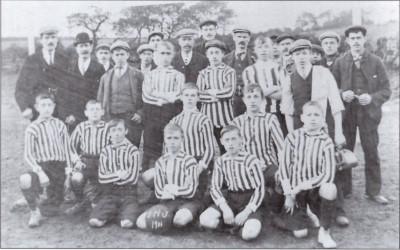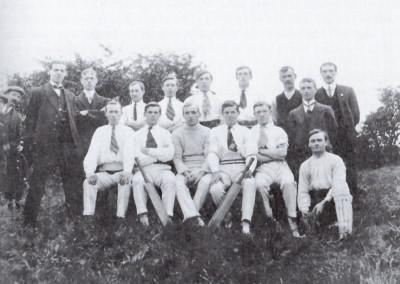Adult Interests
Football, of course, was the tops with Cricket a close second. The main playing ground at Trimdon Station was on the moors, behind Station Road. A beck ran through the centre - the footballers using the right side, the cricketers using the left, where they had an old railway coach as a pavilion. This was where the wives made the tea for the visiting teams. At Trimdon Grange there was even a women's football team.

Deaf Hill Juniors AFC 1906-7.
Quoits was a competitive game. It was an iron ring which was thrown on an iron stake in the ground; the object being to completely encircle the stake. There were teams travelling and competing for points in the various villages. Handball was another competitive game played against a very high wall which was sometimes purpose built. Handball or "Fives" was a skilled game played at what was called the ball alley at the Workman's Club. The idea was to 'stot' the ball and see it rise against the wall. Competitions were arranged with visiting village teams. The first game played there was won by Demsey Gorton against Joe Elliot of Trimdon Grange. The game must have been popular many years ago as it is known that a man named 'Pompey' was champion of England.
Whippet racing and pot share bowling were also competitive pastimes.

Deaf Hill Cricket Club — pre-1914-18 War. Matches were played on the moors.
Apart from the pubs there were also reading rooms in the villages. The Colliery room was the building that had once been the Primitive Chapel in the square. Many men kept pigeons and raced them, housing them in the Crees they built which were called pigeon lofts. The trains were used to carry the baskets of pigeons to the starting points of their races. The women, poor souls, had no such pastimes. They were not even able to visit the pubs. The few people who liked their beer would send a child with a can or a jug to the side door of a pub to buy their refreshment. They gained their outings or meetings if they were members of the church Mother's Union or the Chapel's sisterhood. When funds were needed these members would meet sometimes in each others homes and sew for chapel or church sales of work. Pillowcases, petticoats, aprons etc. would be made, and many people saved a few pence weekly which would be paid out at the time so that they would have money to spend at the sale. Life for some was much improved when Miss Florence Purvis proposed to start a Womens institute. Originally the scheme was to help women and the war effort throughout various countries. It was a place where demonstrations and talks >>